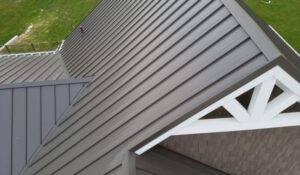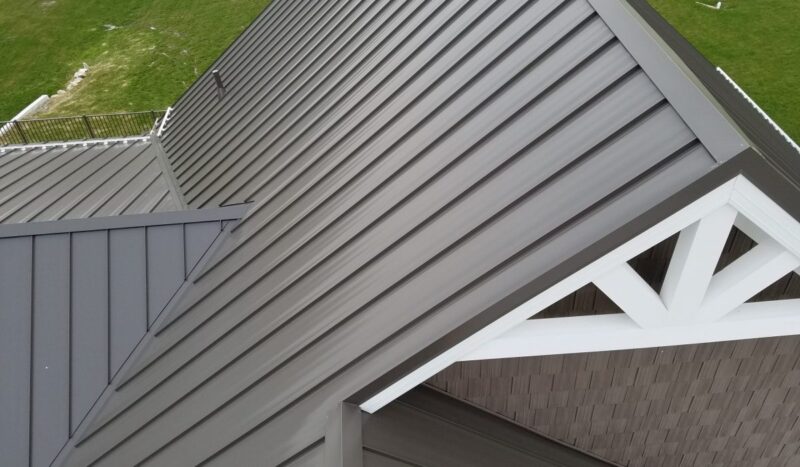Residential roofing is a large investment, and it’s not something homeowners can just replace whenever the need arises. That’s why it pays to understand your options and choose the best roofing materials for your home.

The most common residential roofing material is asphalt shingles. These shingles come in several types and styles, and they pair well with most house designs.
Residential roofs are built to meet the needs of homeowners. They must be able to withstand the elements and comply with building codes. They are also designed to be visually appealing and match the architectural style of the house. Some homeowners even choose to add features like gables or dormers to their homes.
There are many different types of roofing materials used on residential roofs. Some are more affordable than others, while others offer greater durability or weather protection. For example, asphalt shingles are a popular choice for residential roofing, and they come in a variety of colors and styles to fit any home. Other options include metal or tile roofs, which are more durable but can be expensive and require specialized installation.
The design of a residential roof also depends on the type of house and its location. For instance, a sloping roof will be more effective for a home in an area with a lot of rain or snow. Conversely, a flat roof will be more effective in a hot or cold climate.
It is also important to consider the design of the roof structure when choosing a residential roofing material. This will affect the cost and maintenance of the roof. A well-designed roof can protect your home, improve its curb appeal, and increase its value. It should also be able to withstand the weather conditions in your area, such as heavy snow or winds. If you are considering a new residential roof, it is best to do your research and find an experienced company for Calgary roofing services.
Materials
There are many different roofing materials to choose from when constructing a new roof or replacing an existing one. The type of material you select will depend on several factors, such as the weather conditions in your area, the quality of the building’s construction, and the architectural design of your home. You also want to consider your budget and how long you’d like the roof to last.
Asphalt shingles are a popular choice among homeowners due to their affordability and ease of installation. They come in a variety of styles, from the basic 3-tab shingle to the more expensive architectural shingles. The former are sawmilled to a uniform length, width, and thickness for clean lines, while the latter have a rustic, textured look that pairs well with bungalow, Cape Cod, cottage, and Craftsman-style houses.
Slate roofs are a beautiful option for luxury homes and typically last the lifetime of the structure. They are durable and can withstand hail and high wind damage. However, slate is a very costly option.
Metal roofs have seen a resurgence in popularity in recent years. They are durable, easy to maintain, and come in a variety of architectural styles to suit nearly any home. They also offer superior fire resistance and can qualify you for a discount on your homeowner’s insurance.
Another option is composite shingles, which are made from recycled wood and polymer resins. They provide a sturdy, low-maintenance alternative to traditional shingles and are available in a wide variety of colors, including deep reds and dark blues. They are also available with solar panels to help reduce energy costs.
Lastly, there are concrete and clay tiles that add texture to a house. These are non-combustible and energy efficient, but they’re heavy and require a professional installation.
Maintenance
Residential roofing should be maintained regularly to prevent damage and minimize the need for repairs. Regular inspections can detect issues such as missing or damaged shingles, leaks, and problems with the roof’s flashing. It’s also important to ensure that the roof is adequately ventilated and insulated to reduce moisture buildup and regulate indoor temperatures. Homeowners should also pay attention to their gutters and ensure that they aren’t clogged with debris.
There are many different types of residential roofing, each with its own benefits and drawbacks. Asphalt shingles are the most common type of roofing and are affordable and easy to install. They’re also available in a variety of colors and styles to suit any aesthetic. However, they can have a shorter lifespan than other roofing materials and may require more frequent replacement.
Another type of roofing is wood shakes, which offer a rustic, natural aesthetic. They’re often made from cedar, which is naturally resistant to rot and insects. However, they can be more expensive than other roofing materials and may not be suitable for all climates.
When choosing a roofing contractor, it’s important to ask about their experience and expertise in working with different types of residential roofs. A good roofing company will have a history of satisfied customers and can answer any questions you might have about the process. They should also provide a detailed ledger of their work to help homeowners understand the roof’s history and maintenance needs.
Residential roofs are subjected to a lot of stress, from the weather to falling trees and other environmental factors. It’s essential to maintain this barrier between the outside world and your family. Taking the time to perform regular maintenance and inspections will keep your roof in great condition for years to come.
Cost
Residential roofing is the umbrella term for roofing services specific to residential buildings like houses, garages, and apartment buildings. It involves a number of different services, such as roof installation and repair. The cost of residential roofing depends on several factors, such as the size of the roof and the type of materials used. Generally speaking, the price of a residential roof is less than that of a commercial roof.
There are many types of residential roofing materials to choose from, each with its own advantages and disadvantages. Asphalt shingles are a popular choice because they are inexpensive, durable, and easy to install. However, they may not provide as much insulation as other roofing materials.
Another type of residential roofing is slate, which offers a rustic aesthetic and is durable. However, it can be expensive and requires regular maintenance. Metal is another popular choice because it can withstand heavy snow, high winds, and fire. However, it can be expensive and requires specialized installation.
Other types of residential roofing include wood shakes and clay or concrete tiles. Wood shakes offer a natural aesthetic and are durable, but they may require more maintenance than other roofing materials. They are also more susceptible to insect infestation and rot than other roofing materials.
When selecting a residential roof, it is important to consider your local climate and the architectural style of your home. The type of roofing material you choose should also be compatible with your budget and maintenance requirements. In addition, you should always build a 10% contingency into your budget for unexpected expenses.
A residential roof is an essential part of a home, protecting it from the elements and keeping interior temperatures stable. It also protects against storm damage, wind, and hail. A damaged or outdated roof can have serious consequences for your home, including structural damage and water leaks.
To prevent this, it is crucial to maintain your residential roof regularly. Routine inspections should be carried out to identify and correct potential issues, such as missing or damaged shingles and air leaks. In addition, homeowners should keep gutters and downspouts clear of debris to prevent clogging.
